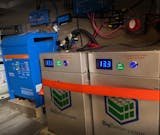If you invest in solar, you are smart. If you invest in both solar and lithium batteries, you are even smarter. Despite the high initial investment in lithium batteries, they have superior longevity and performance. This makes them the best alternative for grid-tie and off-grid applications. When it comes to choosing a battery that fits with your solar system, it's important to understand the benefits that lithium batteries have over lead-acid batteries. Further details will be discussed below.
1) Lithium batteries are efficient.
According to the Electronics Engineers and Institute of Electrical, lead-acid batteries' efficiency is approximately 70% to 80%. This efficiency level will be consistent throughout the life of the battery. Based on the fact that charge controllers and inverters are reaching efficiencies in the high 90s, energy storage systems that are highly efficient will be desirable. Lithium batteries exceed lead-acid batteries because their efficiency is normally 99%
Besides, Lithium batteries are also more efficient when you harvest energy from your renewable energy system. For lead-acid batteries, they have relatively low charge acceptance, which means the energy they can harvest is low so that they won't exceed the required charge currents. However, for lithium batteries, there is no such restriction. On the other hand, their harvest energy can be 100% optimized. For example, you can charge a lithium battery that has a capacity of 100 Ampere-hours with 100A.
2) Lithium batteries are long-lasting.
The definition of the cycle life of a battery is a discharge followed by a recharge. This can determine how long the battery will last which is an essential measure for batteries. In terms of this measure, lithium batteries can last way longer than lead-acid batteries. For example, it will deliver about 400-600 cycles if you discharge your lead-acid battery 100% of its capacity.
However, in terms of lithium batteries, they can deliver 8,000 cycles. The reason of lead-acid battery not lasting as expected is their setbacks when being undercharged. Chronically undercharging lead-acid batteries will lead to reduction of its shelf life by 80%. This is essential because renewable energy sources are naturally intermittent. As a result, batteries will always be operating at partial state of charge. As for Lithium, there is no need to worry about this since working under partial state of charge will not cause any harm to lithium.
3) Lithium is cost-effective.
With lead-acid batteries, there is a strict limit of how much you can discharge your batteries. That’s why you always want to over-size your battery bank. Because majority of lead-acid battery manufacturers do not recommend you discharge their batteries beyond 50%, which means your battery bank needs to be 2 times bigger than it supposed to be. On the other hand, you are allowed to discharge 100% of lithium battery’s energy without any damage. Therefore, their battery bank doesn’t need to be as big.
When the temperatures get low, there will be a significant impact on lead-acid batteries whereas lithium will not be affected that much.
4) Lithium is zero maintenance.
It’s important to monitor and maintain lead-acid batteries carefully. You will have to refill them and there is even a chance to face hazard risk and significant damage, if water levels drop too low. However, unlike lead-acid batteries, there is zero maintenance for lithium batteries after installation, which can save you significant amount of time and money.
In addition, Lithium battery can also save you space! For example, lithium would be the most ideal choice when you are setting up your solar application and running out of room for batteries. Lithium batteries defiantly offers batter energy storage option in almost every scenario. Let us know if you are still unsure about which type of batteries to use for your solar power storage needs. We can assist you to make the best decision that fits with your interest.
Frequently Asked Questions (FAQs)
Q. What are lithium batteries used for?
A. Lithium batteries power electric automobiles, cellphones, laptops, and other devices. Due to their high energy per mass compared to other electrical energy storage methods, lithium-ion batteries are currently employed in the majority of portable consumer gadgets.
Q. How safe are lithium batteries?
A. Lithium batteries are very safe, and they are also the most popular type of battery. Lithium batteries are generally secure and unlikely to malfunction as long as there are no flaws and the batteries are not damaged. Lithium batteries may pose a fire and/or explosion risk if they are damaged or unable to function safely.
Q. Are lithium batteries environmentally friendly?
A. Lithium batteries are environmentally friendly. They have a shallow carbon footprint, and they can be recycled. The environmental benefits of lithium batteries stem from the fact that they do not contain heavy metals like lead, mercury, or cadmium that can cause health problems when released into the environment.


















